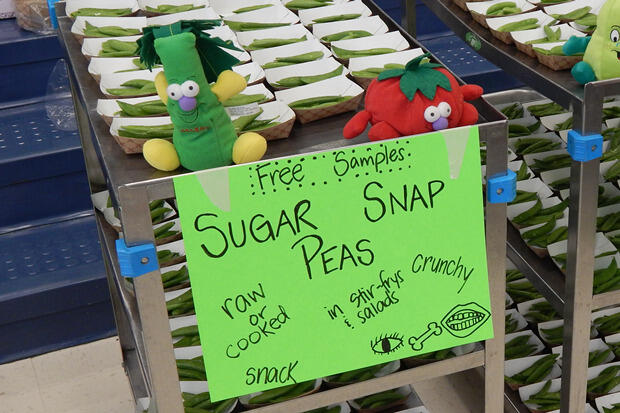
July 28, 2014
Do elementary school students toss out their fruits and veggies? VCU professor aims to find out
Share this story
After new federal school meal regulations were rolled out in 2010, widespread news reports circulated that school children were grossed out by the healthier lunches and were simply tossing the newly required fruits and vegetables and whole grains.
But are the children actually throwing away the healthier food rather than eating it? And, moreover, are there ways that school systems could encourage children to eat their fruits and veggies?
Suzanne Mazzeo, Ph.D., a professor at Virginia Commonwealth University, has received a two-year, $100,000 grant from the National Institutes of Health to find answers to those questions and potentially improve the National School Lunch Program, which provides low-cost or free meals to 31 million children every day across the country.
"As a scientist, I wondered: How much plate waste is really happening? Are kids really throwing away the lunches?" said Mazzeo, a professor in the Department of Psychology in the College of Humanities and Sciences. "So I looked into the literature and saw that there really wasn't a lot of data on whether kids were actually eating less or if they were just complaining about it."
This fall, Mazzeo will lead a team of researchers in two Chesterfield County, Virginia, elementary schools to observe how much fruits and vegetables are being thrown away by first, second and third graders at breakfast and lunch.
This is probably the most unglamorous grant ever. We're going to be standing at the garbage cans. It's going to be messy.
"This is probably the most unglamorous grant ever. We're going to be standing at the garbage cans. It's going to be messy," said Mazzeo, a leading expert in healthy eating and exercise promotion for children and families. "We're focusing on the fruit and vegetable consumption, looking to see whether they ate [the fruits and vegetables], and what percentage they ate. We anticipate that it's going to be somewhat chaotic."
The study will be conducted in partnership with the nonprofit organization Greater Richmond Fit 4 Kids, along with other VCU faculty, graduate students and undergraduate research assistants.
For the second phase of the project, Mazzeo and the research team will hold a "tasting intervention" in one of the schools, offering the students a sample of a fruit or vegetable that will be on the cafeteria's menu the following week.
"The research shows that if you have kids taste a food, then they're more willing to actually eat it," Mazzeo said. "So we're actually going to be in the cafeteria with a little cart and little sample cups. And we'll see if they're willing to try foods that will be on the menu."
The tasting interventions will be held twice a week over eight weeks during this upcoming school year.
"The baseline is: What are they throwing away?" Mazzeo said. "Then we'll do the tasting intervention. And then we'll measure what they're throwing away after [we've done the tasting intervention]."
The third phase of the project will involve qualitative interviews with parents, teachers, administrators and cafeteria workers to better understand their perspectives on what is realistic when it comes to promoting healthy eating for children and their families.
"What do parents or primary caregivers wish schools would do more of?" Mazzeo said. "What do schools wish parents would do? The idea is that qualitative interviews will extend the research a little further for the next step."
Mazzeo was inspired to study the overhaul of the National School Lunch Program because in recent years she has been working with families of overweight children as part of a larger research project aiming to curtail childhood obesity.
"We saw how these families were doing all these really positive things but there's just a lot of structural challenges that make it difficult in everyday life," Mazzeo said. "It shouldn't be this hard for families."
She was also inspired, she said, by her own family's experience.
"Having my own kids and, especially in the last five years, they've both gone to elementary school," she said. "And you see that you really do start to lose control [of the children's healthy eating]."
One of the ideas behind Mazzeo's new study is that school systems would be able to easily replicate the "tasting intervention" strategy to get the students to try unfamiliar fruits and vegetables.
"What we're doing is pretty low-impact. We're using food that's already there, and that the cafeteria workers know how to make already," she said. "We're not doing anything fancy. It's very translatable and sustainable."
Ultimately, Mazzeo said, the study should help answer the debate over whether the National School Lunch Program policy changes – championed by Michelle Obama – have proven effective.
"We want to know whether requiring fruits and vegetables was a good change," she said. "We are truly not sure. Because some of the research says you should give children a choice of whether they want to take the fruits and vegetables or not. And that you should do tastings, but ultimately give them the choice."
Subscribe to VCU News
Subscribe to VCU News at newsletter.vcu.edu and receive a selection of stories, videos, photos, news clips and event listings in your inbox.










